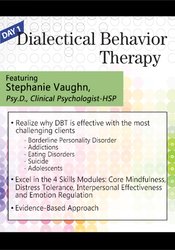

Designed in the early 1990s, Dialectical Behavior Therapy (DBT) gives hope and confidence to clinicians and clients alike. DBT was originally used to treat chronic suicidal individuals. However, clinicians across the country are using DBT to help treat individuals with a wide range of mental illnesses including but not limited to Borderline Personality Disorder, eating disorders, and addictions.
This seminar recording is designed to help you understand why DBT is so effective with your clients and how it works with borderline personality disorder and other mental health disorders. You will also have a solid foundation in DBT through training. Speaker Dr. Stephanie Vaughn will help you demystify topics related to DBT and borderline personality disorder.
Known as a third-wave therapy, DBT moves away from the strict change strategies found in traditional treatments. In DBT, the therapist and the client balance these traditional change strategies with acceptance and mindfulness. It’s the constant back and forth movement between acceptance and change that makes DBT unique.
This online program is worth 6.25 hours CPD.
| File type | File name | Number of pages | |
|---|---|---|---|
| Manual (6.28 MB) | 62 Pages | Available after Purchase | |
| Manual (12.3 MB) | 81 Pages | Available after Purchase | |
| Manual - French (12.3 MB) | 81 Pages | Available after Purchase | |
| Manual - Italian (12.3 MB) | 81 Pages | Available after Purchase |

Stephanie Vaughn, Psy.D., Clinical Psychologist-HSP is the founder of Psyche, PLLC, a boutique outpatient therapy practice located in the Nashville, TN and Boston, MA. She is an associate faculty member at Vanderbilt University in both the psychology and psychiatry departments. Dr. Vaughn conducts Dialectical Behavior Therapy (DBT) with both adolescents and adults as a Board Certified DBT Clinician™. She is an expert on therapy-interfering behaviors and contingency management for oppositional behaviors in adolescents.
Dr. Vaughn has worked in the intensive PTSD program at the Department of Veteran Affairs with soldiers returning from Afghanistan and Iraq and female soldiers suffering from Military Sexual Trauma where she implemented formal Prolonged Exposure (PE). She is active in the teaching and supervision of DBT for Vanderbilt’s psychology & counseling students and doctoral interns, as well as psychiatry residents. Dr. Vaughn has presented DBT workshops around the country for the last seven years and is a highly rated speaker. She founded and currently runs Vanderbilt’s DBT Peer Consultation Group. She has served as an expert consultant for a variety of hospitals, schools, and clinics around the country.
Speaker Disclosures:
Financial: Stephanie Vaughn maintains a private practice. She receives a speaking honorarium from PESI, Inc. She has no relevant financial relationships with ineligible organizations.
Non-financial: Stephanie Vaughn is a member of the American Psychological Association.
Overview of DBT
Modes and Functions of DBT
Stages and Targets of DBT — Structuring the Treatment
The Diary Card
DBT Skills Training
Core Mindfulness Skills
Interpersonal Effectiveness Skills
Emotion Regulation Skills
Please Note: PESI is not affiliated or associated with Marsha M. Linehan, PhD, ABPP, or her organizations.
| 5 |
|
| 4 |
|
| 3 |
|
| 2 |
|
| 1 |
|
Satisfaction Guarantee
Your satisfaction is our goal and our guarantee. Concerns should be addressed to info@pesi.co.uk or call 01235847393.
Please wait ...